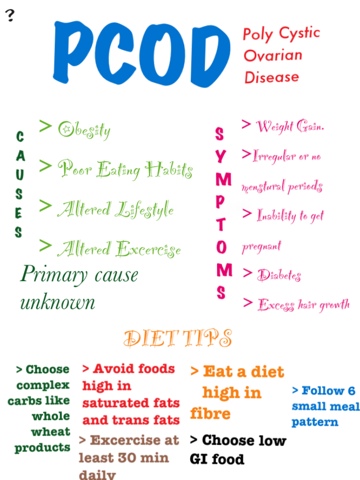Poly Cystic Ovarian Disease (PCOD)
# Poly Cystic Ovarian Disease (PCOD) is a lifetime female hormonal imbalance where maturing eggs fail to be expelled from the ovary, creating an ovary filled with immature follicles (somewhat misleadingly labeled "cysts"). The cysts then contribute to the hormonal imbalance…which causes more cysts
# Polycystic ovarian syndrome (PCOS) or Polycystic ovarian disease (PCOD) is a leading cause of infertility which affects some 35 per cent of women in their reproductive years and more than 90 per cent of obese women.
The incidence of PCOS is rising, perhaps due to
>changing lifestyles,
>altered diet and
>exercise patterns.
> Obesity
Its primary cause remains unclear.
The most common symptoms of PCOD are
> Irregular and infrequent menstrual periods or no menstrual periods at all;
> Infrequent or no ovulation with increased serum levels of male hormones - testosterone;
> Inability to get pregnant within one year of unprotected sexual intercourse;
> Weight gain or obesity;
> Diabetes, over-production of insulin with abnormal lipid levels and high blood pressure;
> Excess growth of hair on the face, chest, stomach in male pattern (hirsutism) and male-pattern baldness or thinning of hair;
Acne, oily skin or dandruff;
DIET TIPS TO TREAT PCOD
# Choose complex carbohydarates like whole wheat products rather than simple carbs ie refined wheat (maida)
# Choose mostly low glycemic index carbohydrates and try to have one of these at each meal like Any vegetable, whole grains ,unprocessed foods.....
# Avoid foods high in saturated fat and trans fat. These can be replaced by ‘healthy fats’ particularly Omega 3 fats and monounsaturated fat
# Eat a diet high in fiber
Fiber helps in two ways with PCOS. The first way they help is by slowing down the digestion of sugars in the body, so there is no spike in insulin. The second way they help is by removing excess estrogens from the body, which may also help to reduce fibroids.
# Exercise at least 30 min daily
Exercise helps PCOD by improving your insulin sensitivity, increasing your metabolism and helping to shed any excess weight. Both aerobic and resistance exercises are good.
# Eat 6 small meals a day rather than having 3 big meals a day.
# Polycystic ovarian syndrome (PCOS) or Polycystic ovarian disease (PCOD) is a leading cause of infertility which affects some 35 per cent of women in their reproductive years and more than 90 per cent of obese women.
The incidence of PCOS is rising, perhaps due to
>changing lifestyles,
>altered diet and
>exercise patterns.
> Obesity
Its primary cause remains unclear.
The most common symptoms of PCOD are
> Irregular and infrequent menstrual periods or no menstrual periods at all;
> Infrequent or no ovulation with increased serum levels of male hormones - testosterone;
> Inability to get pregnant within one year of unprotected sexual intercourse;
> Weight gain or obesity;
> Diabetes, over-production of insulin with abnormal lipid levels and high blood pressure;
> Excess growth of hair on the face, chest, stomach in male pattern (hirsutism) and male-pattern baldness or thinning of hair;
Acne, oily skin or dandruff;
DIET TIPS TO TREAT PCOD
# Choose complex carbohydarates like whole wheat products rather than simple carbs ie refined wheat (maida)
# Choose mostly low glycemic index carbohydrates and try to have one of these at each meal like Any vegetable, whole grains ,unprocessed foods.....
# Avoid foods high in saturated fat and trans fat. These can be replaced by ‘healthy fats’ particularly Omega 3 fats and monounsaturated fat
# Eat a diet high in fiber
Fiber helps in two ways with PCOS. The first way they help is by slowing down the digestion of sugars in the body, so there is no spike in insulin. The second way they help is by removing excess estrogens from the body, which may also help to reduce fibroids.
# Exercise at least 30 min daily
Exercise helps PCOD by improving your insulin sensitivity, increasing your metabolism and helping to shed any excess weight. Both aerobic and resistance exercises are good.
# Eat 6 small meals a day rather than having 3 big meals a day.


is it cure able?
ReplyDelete